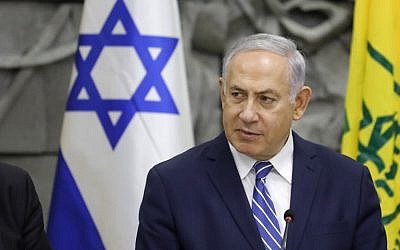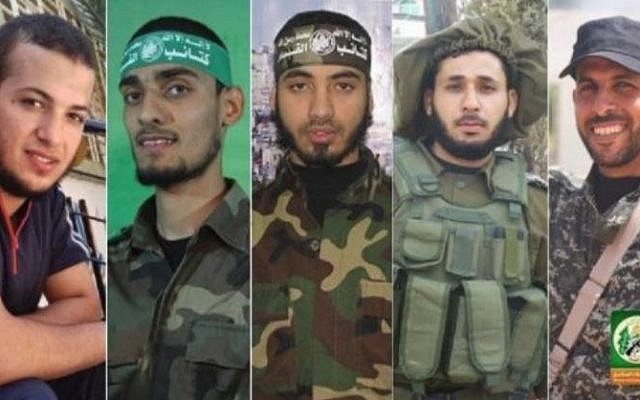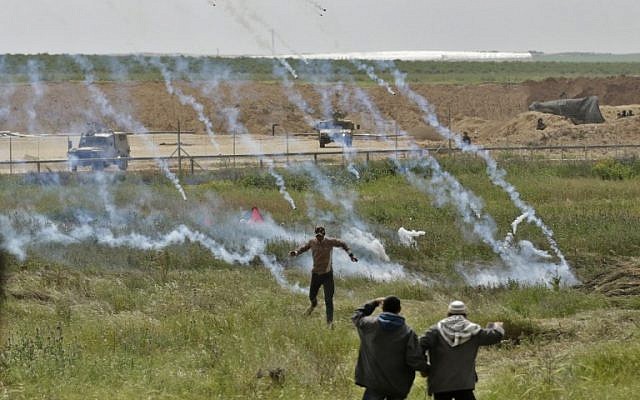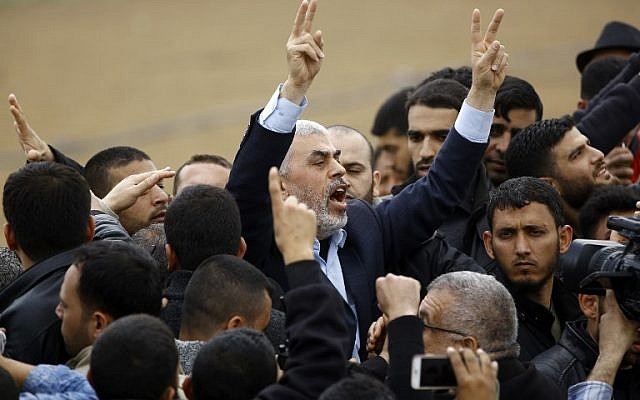Israeli Prime Minister Benjamin Netanyahu on Saturday praised troops for "guarding the country's borders" after a mass Gaza border protest led to violent clashes that left 15 Palestinians dead, up to 10 of them reportedly members of Gaza-based terror organizations, including the ruling Hamas group.
"Respect to our soldiers who are guarding the country's borders and allowing Israeli citizens to celebrate the holiday in peace," Prime Minister Benjamin Netanyahu said Saturday evening, moments after the end of the Sabbath.

Prime Minister Benjamin Netanyahu chairs the weekly cabinet meeting in the southern city of Dimona, March 20, 2018. (Menahem Kahana/AFP)
"Israel acts vigorously and with determination to protect its sovereignty and the security of its citizens," he went on.
Tens of thousands of Palestinians took part in the mass protests on Friday on the Gaza side of the border fence, which soon descended into violence. Dubbed the "March of Return," the protesters called for Palestinians to be allowed to return to land that their ancestors fled from in the 1948 War of Independence.
The Israeli military said the protesters threw firebombs and rocks at soldiers, rolled burning tires at them, sought to breach or damage the border fence, and in one incident opened fire.

Gaza's Hamas terrorist rulers released these images of members of its military wing who it acknowledged were among 15 Gazans it said were killed by Israeli fire during clashes along the security fence on Friday, March 30, 2018.
It said troops opened fire only when necessary, against those taking an active part in violence. It also said there were attempts to damage the fence and break through into Israel, as well as an attempted gun attack against troops.
IDF Spokesman Brig. Gen. Ronen Manelis said on Saturday that all those killed were engaged in violence, adding that Gaza health officials exaggerated the number of those wounded, and that several dozen at most were injured by live fire while the rest were merely shaken up by tear gas and other riot dispersal means.
Friday's violence led to calls by the United Nations and European Union for independent investigations into the use of IDF live fire. The head of the left-wing Meretz party too called for a probe.
Defense Minister Avigdor Liberman on Saturday rejected those calls, writing on social media: "I do not understand the choir of hypocrites who are calling for a commission of inquiry. They got confused and thought Hamas organized a Woodstock festival and we had to give [the marchers] flowers."

A picture taken on March 30, 2018 shows Palestinians fleeing as tear gas grenades begin to drop during a demonstration near the border with Israel east of Gaza City. (AFP/Mahmud Hams)
Netanyahu's spokesman to the foreign press, David Keyes, told the Times of Israel that the United Nations was "hardly the right forum given its decades of anti-Israel obsession. What the UN should be investigating is Hamas — its brutal terror attacks, calls for genocide of Jews, quest to destroy Israel and use of children as human shields."
The Israeli Foreign Ministry said in a statement that the security fence between Israel and Gaza "separates a sovereign state and a terrorist organization… a state that protects its citizens from murderers who send their countrymen into danger.
"The fence separates an army that uses force in self-defense and in a focused and proportionate manner, and Hamas, an organization that sanctifies murder and death, that for years – yesterday included – has been intent on harming millions of Israelis. Anyone who mistakenly views in this murderous spectacle even an iota of freedom of expression is blind to the threats the State of Israel faces," the statement went on.
In a statement on Saturday, the IDF said its forces faced "violent riots and terror attacks" on Friday and that it operated "in strict accordance with the rules of engagement, firing only when necessary and avoiding civilians strategically placed by Hamas in harm's way."
Gaza's protest organizers have said mass marches would continue until May 15, the 70th anniversary of the establishment of the State of Israel. Palestinians mark that date as their "nakba," or catastrophe, when hundreds of thousands left or were forced to leave during the 1948 War of Independence. The vast majority of Gaza's two million people are their descendants.
Hamas praised the march and the planned 6-week camp demonstration, with Gaza leader Ismail Haniyeh saying on Friday that the protests marked the beginning of the Palestinians' return to "all of Palestine."
"We are here to declare today that our people will not agree to keep the 'right of return' only as a slogan," he said.

Islamist Hamas terror group leader Yahya Sinwar shouts slogans and flashes the victory gesture as he takes part in a protest near the border with Israel east of Jabaliya in the northern Gaza Strip, on March 30, 2018. (AFP/ Mohammed ABED)
Yahya Sinwar, the Hamas leader in Gaza, said in a speech to protesters Friday that "The March of Return… will not stop until we remove this transient border." Friday's protests, he said, "mark the beginning of a new phase in the Palestinian national struggle on the road to liberation and return [of Palestinian refugees and their descendants to their former homes inside Israel]."
The "March of Return," Sinwar added, "affirms that our people can't give up one inch of the land of Palestine."
At previous peace talks, the Palestinians have always demanded, along with sovereignty in the West Bank, Gaza, East Jerusalem, and the Old City, a "right of return" to Israel for Palestinian refugees who left or were forced out of Israel when it was established. The Palestinians demand this right not only for those of the hundreds of thousands of refugees who are still alive — a figure estimated in the low tens of thousands — but also for their descendants, who number in the millions.
No Israeli government would ever be likely to accept this demand, since it would spell the end of Israel as a Jewish-majority state. Israel's position is that Palestinian refugees and their descendants would become citizens of a Palestinian state at the culmination of the peace process, just as Jews who fled or were forced out of Middle Eastern countries by hostile governments became citizens of Israel.














No comments:
Post a Comment